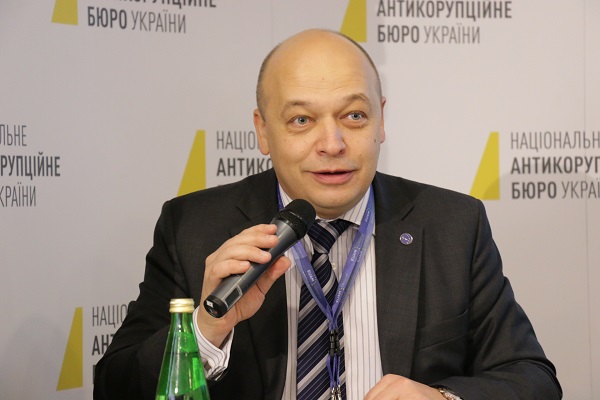Undermining the fight against corruption is no way to improve human rights for Ukrainians
December 11, 2017
Today, 10 December, is International Human Rights Day, marking the anniversary of the adoption by the United Nations of the Universal Declaration of Human Rights in 1948. If ever there was proof that from profound darkness and tragedy, good things can emerge, then the Universal Declaration of Human Rights might be it. The Declaration, born amid the ashes of the Second World War, is one of the great achievements of the United Nations. Its 30 articles follow on from Franklin D Roosevelt’s ‘Four Freedoms’ – freedom of speech, freedom of religion, freedom from fear, freedom from want – that he articulated in 1941.
The Declaration enshrines the concepts of dignity, equality, respect, justice, freedom for all individuals, and covers individual rights such as the right to life, movement, security, expression, a decent standard of living, political opinion, and equality before the law – irrespective of one’s gender, religion, colour, language, nationality, race or social status.
The first 12 words of Article 1 of the Declaration are possibly the most famous words in the history of human rights, and remain as true today as they ever were. ‘All human beings are born free and equal in dignity and rights.’ It is a sentence both poetically beautiful and individually liberating. Now, with the Declaration about to turn 70, the Declaration’s central mantra and 30 articles should be repeated and reinforced – not just on 10 December, but 365 days a year.
In Ukraine, human rights suffered under the Yanukovych regime. Indeed, the Maidan Revolution, a mass expression of outrage over political corruption, was essentially a cry for respect of human rights. Any society that wishes to describe itself as democratic must embrace and protect human rights. Furthermore, the systemic democratic reform that Ukraine needs urgently is simply not possible without a human-rights component underpinning all facets of government and society. If this goes unfulfilled, I am sure that at some point the Ukrainian people will rise up against injustice and corruption once again.
Since Maidan, Ukraine has adopted a human rights strategy and action plan until 2020, something that the European Union Advisory Mission (EUAM), together with our fellow international donors, supported through advice and recommendations. The Human Rights Action Plan is of course a step in the right direction, but without dedicated government budgeting and a monitoring mechanism it cannot be implemented.
The National Police of Ukraine (NPU) has been reformed in such as a way as to emphasize service provision over enforcement, while EUAM continues to work closely with the NPU to reform approaches to freedom of assembly and public order. A cornerstone of democratic policing is that the freedom to assemble peacefully is a right to be protected, not suppressed. When viewed together with a stronger and more proactive civil society – one of the great legacies of Maidan – these must be considered positive developments.
There are also issues of grave concern, however. A corrupt system is in itself a profound denial of citizens of their human rights, and efforts that Ukraine has made in tackling corruption are incomplete. Too often, we have seen the new anti-corruption agencies prevented from doing their work, and used as pawns to deepen political gamesmanship among various law-enforcement agencies. Just last week, the public disclosure of a corruption investigation by the General Prosecutor’s Office significantly weakens the capacity of the National Anti-corruption Bureau of Ukraine (NABU) to effectively conduct investigations and undermines public trust in an effective fight against corruption.
What really needs to happen is simple: the delivery of justice and respect for the rule of law. Ukrainian authorities have to reinforce their efforts to ensure the independence, operational capacity and full effectiveness of the anti-corruption institutions. The work of these institutions must not be undermined but reinforced. NABU investigators are doing an important job, and remember, they and their families have rights too. Just imagine how their motivation and trust must be damaged when institutions also supposedly defending the rule of law put them under threat by disclosing their names. Imagine how undercover Security Service (SSU) officers working in the East would feel in such a scenario; because in future, the same misguided logic might be used to justify disclosure of their names, too.
The reform of the SSU is much needed also, and that depends on presidential approval of the Concept on the Reform of the Security Service, a pivotal document that has radical implications for the civilian security sector as a whole as well as the Security Service itself. It should be approved immediately.
As a final thought, I want to go back to one of Roosevelt’s ‘four freedoms’ – the freedom of speech. No democracy can flourish without the free expression of opinion, and being able to do so in comfort, free from threat or fear. For journalists this human right has a double significance; they are citizens themselves of course, but the expression of opinion is also the tool they use to do their job. Without a robust, dynamic and free media, government action can go unchecked. Government is accountable to citizens, and the media must be free to question government decisions on behalf of the people. Journalists therefore have the right to expect to be able to do their jobs independently, free from intimidation or the threat of violence.
Progress in human rights and the rule of law is key to Ukraine’s future, and I believe that even moderate advances in any single area can have an avalanche effect – eventually, small changes accumulate to result in meaningful change for people. That is the end result, I believe, that the authors of the Universal Declaration of Human Rights would have wished for.

EUAM Head of Mission
This opinion piece was originally published in Ukrainska Pravda on 10 December 2017


